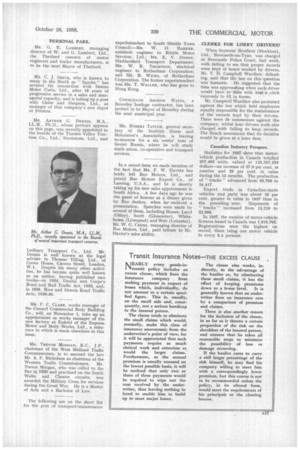Transit Insurance Notes—THE EXCESS CLAUSE N EARLY every goods-intransit policy includes
Page 27

If you've noticed an error in this article please click here to report it so we can fix it.
an excess clause, which frees the insurance company from making payment in respect of losses which, individually, do not amount to a certain specified figure. This is, usually, on the small side and, consequently, not a serious handicap to the insured person.
The clause tends to eliminate the small claims which would, normally, make this class of insurance uneconomic from the underwriter's point of view, for it will be appreciated that such payments require as much clerical work and attention as would the larger claims. Furthermore, as the annual premium is usually assessed on the lowest possible basis, it will be realized that only two or three of these payments would be required to wipe out the sum received by the underwriter, thus leaving nothing in hand to enable him to build up to meet major losses.
The clause also works, indirectly, to the advantage of the haulier as, by eliminating these small claims, it has the effect of keeping premiums down to a lower level. It is generally known that an underwriter fixes an insurance rate by a comparison of premium and claims.
There is also another reason for the inclusion of the clause, in so far as it throws a certain proportion of the risk on the shoulders of the insured person, and ensures that he takes all reasonable steps to minimize the possibility of loss or damage occurring.
If the haulier cares to carry a still larger percentage of the risk himself, he may find his company willing to meet him with a correspondingly lower premium, but this course is not to be recommended unless the policy, in its altered form, would meet the requirements of his principals or the clearing houses.




















































































